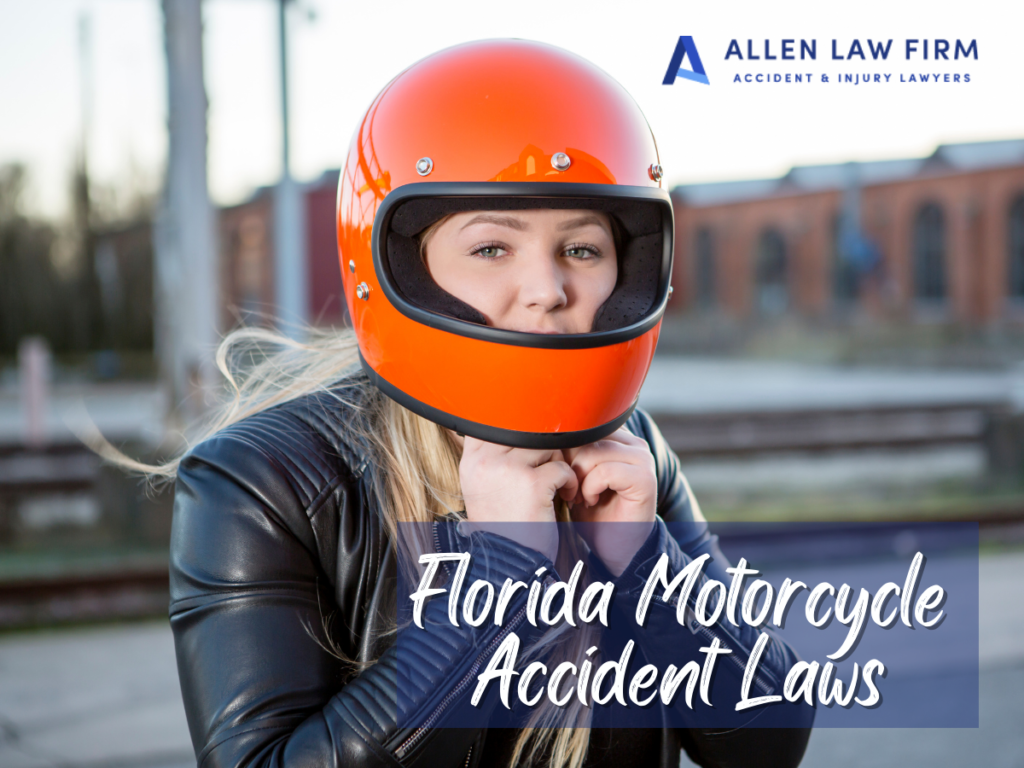Florida Motorcycle Helmet Laws – Does Florida Have A Helmet
Bill Allen | May 18, 2022 | Florida Law

Many states have universal helmet laws for motorcyclists due to the inherent risks that come with riding one. Florida laws near you require that all riders wear an approved motorcycle helmet – and helmets can reduce brain injuries and permanent disability during a motorcycle accident. However, there is an exception to that law.
Florida Motorcycle Helmet Laws Near You
Florida Statute §316.211 states that no one may ride or operate a motorcycle unless they wear protective headgear. The helmet must comply with Federal Motorcycle Vehicle Safety Standard 218. In addition, riders must wear eye protection.
The law does not apply to individuals riding in an enclosed cab. It also does not apply to riders 16 years of age who are operating a motorcycle of less than 50 cc or that will not exceed a speed of 30 mph on level ground.
Individuals under the age of 16 years cannot ride a moped unless they wear a helmet that complies with FMV Safety Standard 218.
Are There Exceptions to Florida’s Motorcycle Helmet Law?
Yes, there is an exception to Florida’s motorcycle helmet law for riders 21 years of age and older.
If a rider is 21 or older, they may choose not to wear a motorcycle helmet. However, the person must be covered by an insurance policy that provides a minimum of $10,000 in medical benefits. The exception went into effect on July 1, 2000.
Riders must have proof of insurance if they are stopped by a police officer, such as an insurance card or a copy of the declaration page. The insurance card or policy must show that the policy is current and from a recognized health insurance provider.
Limited motorcycle medical coverage would also be acceptable. However, PIP (Personal Injury Protection) insurance would not be acceptable. PIP coverage does not apply to motorcycle operators or passengers in Florida.

Motorcycle Accident Statistics for Florida and the United States
Riding a motorcycle can be very enjoyable. However, it can also be dangerous. According to the NHTSA, motorcyclists were 28 times more likely to die in a motor vehicle accident than passenger vehicle occupants. In 2020, 5,579 motorcyclists died in crashes nationwide.
In Florida, 552 riders died in motorcycle crashes statewide in 2020. An additional 6,384 motorcyclists sustained injuries in motorcycle accidents.
While riders cannot control road conditions, weather conditions, or the conduct of other drivers, they can take steps to protect themselves from injuries and life-threatening conditions in the event of a motorcycle crash.
Wearing motorcycle helmets is just one of the ways a rider can protect themselves from catastrophic injury.
Do Motorcycle Helmets Save Lives?
According to studies, when you choose the correct motorcycle helmet, it can reduce your risk of a severe injury or death. The Centers for Disease Control report that motorcycle helmets saved 1,859 lives in 2016. If all riders had been wearing helmets, an additional 802 lives could have been saved.
Motorcycle helmets can reduce the risk of death from a motorcycle crash by thirty-seven percent. They can reduce the risk of a head injury by sixty-nine percent.
A head injury can result in traumatic brain damage or death. If the person lives, they could experience cognitive, physical, and emotional impairments because of the brain injury.
Some individuals may incur lifelong medical expenses and personal care costs because of a brain injury. Brain damage could result in the loss of income and benefits. A rider may never return to work after a traumatic brain injury.
Therefore, it is always in a rider’s best interest to wear a motorcycle helmet each time they ride. Even if the person is exempt from wearing a helmet under Florida’s motorcycle helmet laws, it is wise to wear the helmet to reduce the risk of injuries because of a motorcycle crash.
Florida’s Helmet Law
In the late 1960s, Congress passed a law requiring states to pass a universal helmet law to receive their full highway funding. This mandate was eliminated in the mid-1970s. However, most states had already passed universal helmet laws by that time.
Florida had a universal helmet law. It was found to be constitutional by the Florida Supreme Court in 1969. But in two separate decisions in the 1990s, the Florida Supreme Court gutted the motorcycle helmet law.
Rather than passing a new universal helmet law, Florida’s legislature passed an age-based helmet law that went into effect in July of 2000.
This new law maintained the helmet requirement for motorcycle operators and passengers under 21 years old. However, those who are 21 years and older have the choice to ride without a helmet if they have at least $10,000 in health insurance.
The idea was to give motorcycle operators and passengers the freedom to ride without a helmet if they had the means to deal with the consequences of their choice.
Enforcement of Florida’s Helmet Law
Florida’s helmet law does not specify whether the police should enforce helmet use as a primary or secondary offense. As a result, police officers can stop you from not wearing a helmet to check your age and insurance status.
In most cases, police officers will avoid doing this because of the difficulty in ascertaining someone’s age from a distance. If someone lacking a helmet clearly looks younger than 21, such as a child passenger, police officers can stop you and cite you, even if you have not broken any other traffic laws.
But these situations rarely occur. Instead of looking for helmet violations as a primary offense, police officers will often issue a citation for a helmet violation only after stopping you for another violation, like speeding.
Since the age requirement of the law makes it largely unenforceable, many experts in motorcycle safety consider age-based helmet laws to be equivalent to having no law at all.
Reasons to Always Wear a Helmet
Even if Florida’s law exempts you from wearing a helmet, you should consider wearing one anyway. Researchers have been able to measure the overall effectiveness of helmet use. Here’s what they found:
Decreased Risk of Death
The replacement of Florida’s universal helmet law with the age-based helmet law in 2000 was followed almost immediately by an increase in fatal motorcycle accidents. Using just the raw numbers, motorcycle deaths increased by almost 49% the year after repeal.
But the repeal of the helmet law also led to an increase in the number of registered motorcycles and the average number of miles motorcyclists drove. Researchers adjusted the raw numbers to account for the increased usage.
Deaths still increased by 38% when normalized to the number of miles driven. When normalized to the number of registered motorcycles, deaths increased by 22%.
This means that by every measure, deaths increased after the legislature ended universal helmet requirements.
Florida’s experience matches that of other states. Texas, Arkansas, Louisiana, and Kentucky also repealed their helmet laws around the same time.
Texas saw motorcycle accident deaths increase by 31%. Arkansas motorcycle deaths increased by 21%. Kentucky’s motorcycle fatalities increased by 50%, and Louisiana saw a 100% increase in motorcycle deaths after they repealed their universal helmet laws.
Based on these statistics, researchers have concluded that wearing a helmet reduces your risk of dying in a motorcycle accent by around 40%.
Decreased Risk of Brain Injury
The risk of a brain injury increases if you do not wear a helmet. After the state repealed its helmet law, Florida saw a 32% increase in serious motorcycle accident injuries and an increase of 28% in minor motorcycle accident injuries.
But adjusted for the increase in ridership after the change in the helmet law, these increases are negligible. This probably means that injuries shifted upward in severity.
Motorcycle accidents that would have produced no injuries to a helmeted motorcyclist caused minor injuries without a helmet. Minor injuries became severe injuries when helmet use declined.
As a result, a minor bump on the head with a helmet could result in a concussion or worse without a helmet.
These numbers match the statistics in other states. Texas saw the number of serious injuries remain relatively stable after it ended universal helmet requirements. But the proportion of brain injuries increased.
According to insurance industry research, unhelmeted motorcyclists are three times more likely to suffer a traumatic brain injury than helmeted motorcyclists.
Equally concerning, the cost of treating brain injuries also increased. This implies that the brain injuries after the helmet law repeal were more serious and required more treatment and therapy.
Greater Likelihood of Recovering Injury Compensation
Going without a helmet comes with many consequences:
- Increased risk of death
- Increased risk of brain injury
- Increased medical expenses after an accident
Another consequence arises from Florida’s comparative negligence statute. If an accident victim contributed to their injury, a judge must reduce their damage award. For example, if a jury finds that you were 15% at fault for your injuries, you can only recover 85% of your damages.
If you fail to wear a helmet, you risk losing the right to recover all of your damages after an accident. A jury could find that your decision to ride without a helmet contributed to your head or brain injuries. This will result in a reduction of your damage award.
The risks of riding without a helmet are high and numerous. Even though it may not be a legal obligation, it remains a good idea to wear a helmet while operating or riding on a motorcycle.
To discuss how your helmet use might affect your compensation after your motorcycle accident, contact Allen Law Accident & Injury Lawyers for a free consultation. We’ll explore the facts of your case with you and help you to find a plan to move forward.
Can I Recover Compensation for a Motorcycle Accident in Florida if I am Not Wearing a Helmet?
It depends. If you are over 21 years of age and have the required insurance, you are not breaking the law by riding without a motorcycle helmet. However, if you sustain a brain injury in a crash, an insurance company or defense team may argue that you were negligent in not wearing a helmet. They may argue that your brain injury would not have been as severe if you were wearing a helmet.
Under Florida’s pure comparative fault laws, a person who is partially at fault for the cause of their injury can have their compensation reduced. The reduction is equal to the person’s percentage of fault for their injuries.
Since studies indicate wearing a helmet reduces injuries and saves lives, the matter could be complicated. It would be up to a jury to decide whether you were acting negligently by not wearing a helmet. After a motorcycle accident, the best thing you can do is to contact an experienced motorcycle accident lawyer to discuss your case — regardless of whether you were wearing a helmet or not.
Frequently Asked Questions About Motorcycle Helmet Laws in Florida
What are the motorcycle helmet laws in Florida?
In Florida, anyone with a motorcycle license under 21 years old must wear a helmet. There are exceptions if the 16-21-year-old rider is operating a motorcycle 50cc or lower. Riders are all required to wear eye protection.
Is it illegal to not wear a helmet on a motorcycle in Florida?
If you are over 21 years old, you are not required to wear a helmet on a motorcycle in Florida if you also carry insurance coverage that also supplies at least $10,000 in medical benefits.
Contact Our Motorcycle Accident Law Firm in North Central Florida
If you need legal assistance, contact the Gainesville motorcycle accident lawyers at Allen Law Accident & Injury Lawyers at your nearest location to schedule a free consultation today.
We have two convenient locations in North Central Florida:
Allen Law Accident & Injury Lawyers – Gainesville office
2550 SW 76th St #150
Gainesville, FL 32608
(877) 255-3652
Allen Law Accident & Injury Lawyers – Ocala Office
112 S Pine Ave
Ocala, FL 34471
(352) 351-3258
Florida Motorcycle Accidents Review
The level of professionalism at the Allen Law Firm is unmatched. Bill Allen’s leadership and legal expertise ensure that every client receives outstanding representation. I am constantly impressed by their attention to detail and commitment to excellence!
Gabriela Moreno
⭐⭐⭐⭐⭐
https://maps.app.goo.gl/Ri2vWg2Vj
Read more of our Google reviews.
Locations Where You Can Buy Motorcycle Helmets in Gainesville
- RideNow Powersports – Gainesville – 4820 NW 13th St, Gainesville, FL 32609 – (352) 376-2637
- Solano Cycle of Gainesville – 1024 S Main St, Gainesville, FL 32601 – (352) 338-8450
- Gainesville Harley Davidson – 4125 NW 97th Blvd, Gainesville, FL 32606 – (352) 331-6363

